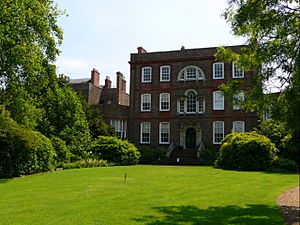Alexander Peckover, 1st Baron Peckover facts for kids
Quick facts for kids
Alexander Peckover
|
|
|---|---|

Bank House (now Peckover House) in Wisbech, the seat of Lord Peckover
|
|
| Born | 16 August 1830 |
| Died | 21 October 1919 |
| Nationality | British |
| Occupation | banker, philanthropist |
Alexander Peckover, 1st Baron Peckover (born August 16, 1830 – died October 21, 1919) was an important English banker. He was also a Quaker, which is a Christian group known for its peaceful beliefs. Alexander Peckover was also a philanthropist, meaning he liked to help others. He was also famous for collecting old and rare books and papers.
Early Life
Alexander Peckover was born in a town called Wisbech, in Cambridgeshire, England. His family lived in a large house known as Bank House, which is now called Peckover House and Garden.
His father was Algernon Peckover. His mother, Priscilla Alexander, came from a family of Quaker bankers in Ipswich. Alexander also had a sister named Priscilla Hannah Peckover. He went to school at Grove House School in Tottenham, London.
His Career as a Banker
The Peckover family was well-known for their banking business. Alexander started working at the Peckover Bank in 1847 when he was just 17 years old. He worked very hard and moved up the ranks.
By 1866, he became a partner in the bank, which later joined with another bank to become Gurney, Peckover and Company. He retired from banking in 1894.
Like his sister, Priscilla Hannah Peckover, Alexander was also a strong supporter of peace. He often led meetings for the Wisbech Local Peace Association.
Life After Retirement
After retiring, Alexander Peckover spent his time on other interests. He studied weather patterns and continued to collect old manuscripts. These were handwritten books and documents from long ago.
He was a member of several important societies. These included the Royal Geographical Society, which studies geography, and the Society of Antiquaries of London, which focuses on history and old objects. He was also part of the Linnean Society of London, which is about nature and biology.
In 1893, he was given a special job called Lord-Lieutenant of Cambridgeshire. This was a high-ranking position representing the King or Queen in the county. Alexander was the first person who was not from a noble family and not a member of the Church of England to hold this job in Cambridgeshire. Because he was a Quaker, he was allowed to wear special court clothes instead of a military uniform. He also didn't have to take part in military events.
A year later, he was given the title of Baron Peckover. This made him a Lord, and his full title became Lord Peckover of Wisbech. In 1905, Cambridge University gave him an honorary degree.
Alexander Peckover passed away in October 1919, when he was 89 years old. Since he had no sons, his title of Baron ended with him.
His Family
In 1858, Alexander Peckover married Eliza Sharples. She was the daughter of Joseph Sharples, who was also a banker. They had three daughters named Elizabeth Josephine, Alexandrina, and Anna Jane.
Sadly, Eliza died in August 1862, only a year after their youngest child was born. Alexander Peckover never remarried and remained a widower for the rest of his life.
His daughter Elizabeth married an artist named J. Doyle Penrose. They had four sons: Alexander Peckover, Lionel Sharples, Roland Algernon, and Bernard Edmund.
His Legacy
Today, Bank House, Alexander Peckover's family home, is known as Peckover House and Garden. It is now owned by the National Trust, a charity that protects historic places. Parts of the estate are used by local sports clubs for rugby, hockey, and cricket. There is also a school nearby called Peckover Primary School.
In 1864, Alexander's second son, Algernon, helped start the Wisbech Social Club and Institute. This club aimed to offer educational and fun activities for working-class people.
After his wife's death in 1864, Alexander went on a trip to Egypt with some banking friends. Some of the interesting objects he brought back from this trip can now be seen at the Wisbech & Fenland Museum.
The original bank building became too small, so a new one was built nearby. This building later became a branch of Barclays Bank.
Alexander Peckover also gave a special ceremonial mace to the town of Municipal Borough of Wisbech. This mace is still used today by the Wisbech Town Council.
You can find roads in Wisbech named after Alexander and his family, such as Quaker Lane, Peckover Drive, and Penrose Gardens.
 | John T. Biggers |
 | Thomas Blackshear |
 | Mark Bradford |
 | Beverly Buchanan |

